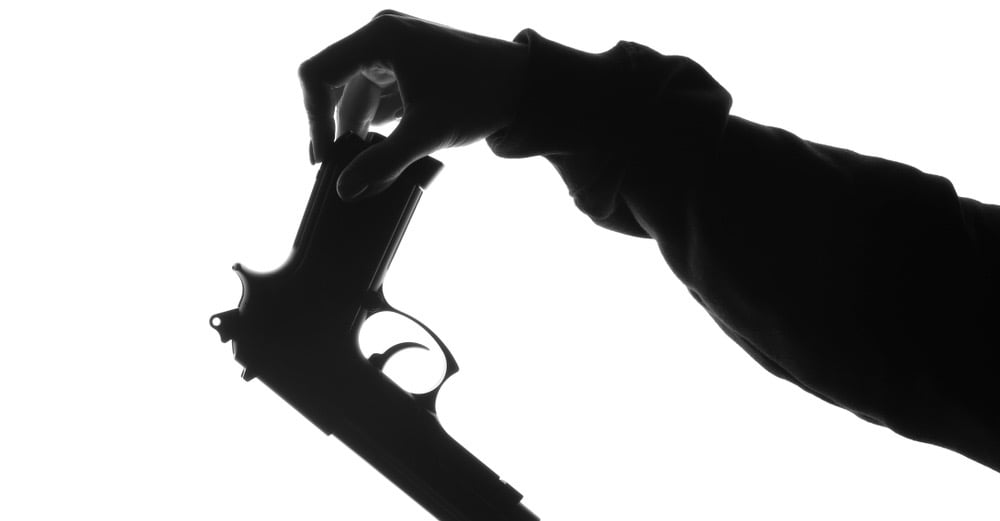Justin Tidwell-Davis seldom thought about his life in the long term. For more than a decade, he’s struggled with bipolar II, a condition linked to high rates of suicide. At his low points, imagining a future was difficult. Tidwell-Davis said it wasn’t until he met his husband that his outlook changed.
“We now have a house and dreams we’d like to pursue and trips we’d like to take,” said Tidwell-Davis, 35, who lives in Bremerton, Washington, just across Puget Sound from Seattle. With a more developed sense of how his life might unfold, he said, “I want to protect that.”
To do so, Davis and his husband, Daniel, chose to take advantage of an innovative suicide-prevention initiative in Washington State. Beginning this past January, state residents concerned about their risk for suicide have been able to voluntarily waive their rights to own a gun. The program, covered in The Trace in May, has been described as an experiment in granting autonomy to those who struggle with depression and other mental illnesses. Fredrick Vars, the Alabama law professor who conceived the idea, said he hoped it would give people with mental health problems “the liberty to control gun purchasability.”
But when Tidwell-Davis and his husband tried to submit their waivers to their Kitsap County clerk, where the law requires they be filed, the office receptionist was “bewildered” — he didn’t know it existed. Only after Tidwell-Davis showed the clerk a readout of the legislation on his phone did he accept and process their paperwork.
When states pass new laws, implementation frequently poses a distinct set of hurdles, especially for those laws whose passage excites little media attention. In some cases, activating every last, straggling branch of the bureaucratic tree can prove so difficult or inefficient that laws are simply repealed altogether. The situation is not yet so dire in Washington, but efforts to implement the voluntary suicide waiver law have largely foundered.
The Trace called all 39 county clerk’s offices in the state of Washington. Eleven had never heard of the law, and weren’t sure of the protocols for complying with it. A full third said they didn’t have the forms on hand, though the law requires every clerk’s office to maintain printed copies.
Since the law went into effect in January, only eight people, including Tidwell-Davis, have used the law to suspend their gun rights, according to the Washington State Patrol, which is responsible for entering each individual’s information into the federal background check system. None have filed to revoke their waivers.
No central office or agency has been charged with ensuring compliance with the new law, according to a spokesperson for the Washington court system, which includes the county clerks’ offices. It’s also unclear which branch of the state government is responsible for promoting it. As one Thurston County clerk said: “We had trouble finding the forms because we’ve never had to use them before. We’ve not gotten any sort of training from the government, either.”
A spokesperson for Governor Jay Inslee’s office said the governor’s policy advisor hadn’t heard about Tidwell-Davis’s specific case, though Tidwell-Davis had tagged Inslee in tweets recounting it. After reaching out to the court system about the lack of awareness, the spokesperson said an official had assured her they would look into it.
Dr. Jennifer Stuber, a suicide prevention researcher at the University of Washington who co-founded the university’s suicide prevention center, Forefront, said a lack of public awareness about programs like the do-not-sell list can pose a risk to individuals like Tidwell-Davis. “If he were to go into a manic episode, for example, and if suicide is something he deals with in those states, then the fact that the state was unable to implement the law is problematic,” she said. “It’s not serving its intended life-saving potential if it’s not being implemented.”
In 2017, the latest year for which full data from the Centers for Disease Control and Prevention is available, nearly 50,000 people died from suicide in the United States. About half of those deaths involved a firearm. Gun suicides, which represent about 60 percent of all firearms-related deaths, are at a nearly 20-year high. Yet despite the human toll, few pieces of gun legislation center on suicide prevention.
It’s for this reason that those like Tidwell-Davis, who have struggled against thoughts of suicide, say it’s critical that Washington State ensures that its residents know about the tools at their disposal. “If one life is lost because there’s no knowledge of this law then that’s one too many,” he said.


